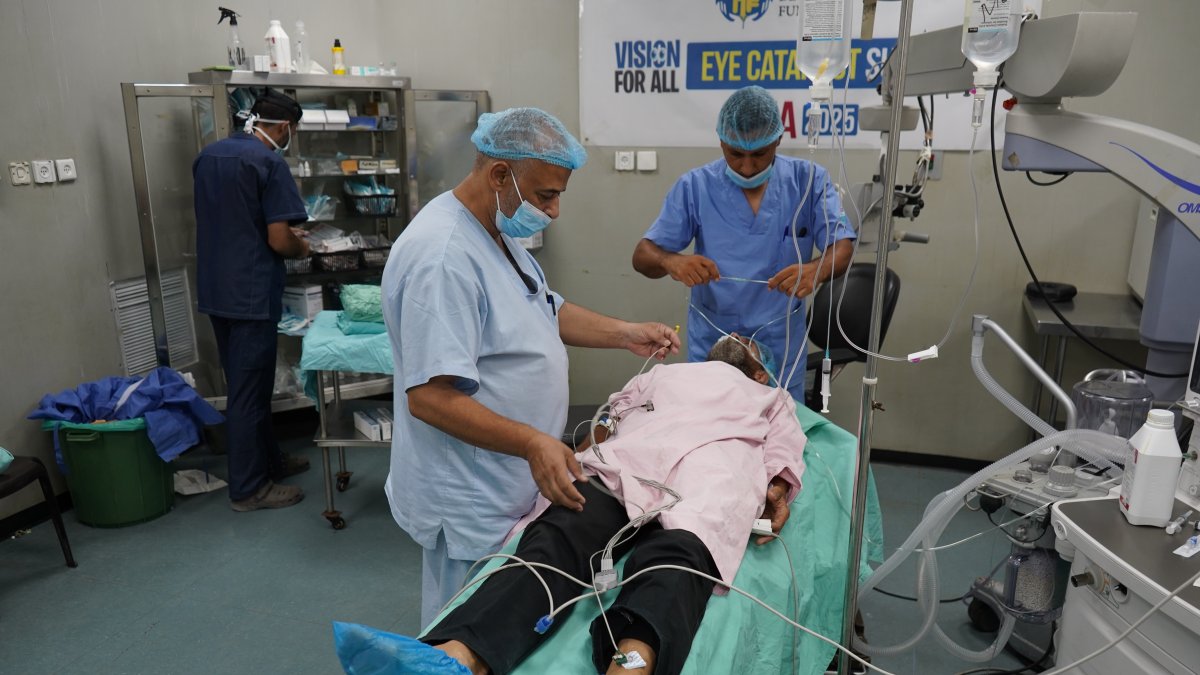Inside Gaza City’s Eye Hospital, the Strip’s main center for ophthalmic surgeries, the steady hum of medical equipment and the rhythmic beeps of monitors mingle with the labored breaths of doctors racing to save lives.
Their faces bear deep lines of exhaustion – the toll of Israel’s blockade and what Palestinians describe as a starvation policy that has gripped the territory for 22 months.
Driven by duty, surgeons work marathon shifts under siege conditions that have turned bread into a rarity and made sugar and protein costlier than gold. “We keep going because we have no choice,” one doctor told Anadolu Agency (AA).
The U.N.’s World Food Program warns that one-third of Gaza’s 2.4 million people have gone days without eating, calling the crisis an “unprecedented” humanitarian collapse.
Hundreds of aid trucks are needed daily to stave off famine, the U.N. says, as hunger tightens its grip on a population already enduring war.
Losing weight
Mohammed Al-Tayeb, 33, an ophthalmologist, said he has been practicing for seven years, but the last two have been the hardest – especially since March, when he and his colleagues, along with all of Gaza’s residents, endured what he called “systematic starvation.”
“We work double shifts because of the targeting of aid seekers,” he said, referring to Israeli forces shooting at Palestinians waiting for the rare humanitarian assistance.
On Sunday, the Gaza Health Ministry reported that hospitals received 35 bodies and 304 wounded aid seekers within 24 hours due to Israeli attacks, bringing the total since May 27 to 1,778 killed and 12,894 injured.
“Our salaries come every two or three months as an advance that barely covers the cost of flour,” Al-Tayeb said.
Surgical operations have surged from one a month before the war to three a day, each lasting one to three hours, he added.
Eating only one meal a day, he has lost 10 kilograms (22 pounds) since March. “I walk several kilometers to the hospital and can’t find sugar or protein. Even pregnant women and children are deprived of essential food,” he said.
IV drips for doctors
Hospital director Abdel Salam Sabbah described the situation as “difficult and bitter” for medical and administrative teams.
“Doctors collapse in operating rooms from exhaustion and lack of food, and we give them IV fluids so they can keep working,” he said.
Most staff arrive at work on empty stomachs and get one meal a day.
Dr. Iyad Abu Karsh, head of the anesthesia department for 25 years, said malnutrition and food scarcity have caused severe fatigue, especially as working hours have doubled to round-the-clock shifts.
Delicate surgeries to save sight or lives demand high concentration and energy, he said, “but our meals are meager.”
Exhaustion and dizziness
“We feel extreme fatigue, dizziness and headaches while working,” said Dr. Maha Daban, describing the effect of food shortages on doctors’ health and performance.
“Our heartbeats are faster, and I’ve lost 8 kilograms (18 pounds). The blockade has deprived us of vitamins and proteins,” she added. “Our bodies need proper nutrition, and without it, I cannot give the same energy to save a patient.”
Israel is facing mounting condemnation for its war on Gaza, where it has killed nearly 61,600 people since October 2023, according to local health authorities.
Last November, the International Criminal Court issued arrest warrants for Israeli Prime Minister Benjamin Netanyahu and former Defense Minister Yoav Gallant for war crimes and crimes against humanity in Gaza.
Israel also faces a genocide case at the International Court of Justice over its conduct in the enclave.

The Daily Sabah Newsletter
Keep up to date with what’s happening in Turkey,
it’s region and the world.
SIGN ME UP
You can unsubscribe at any time. By signing up you are agreeing to our Terms of Use and Privacy Policy.
This site is protected by reCAPTCHA and the Google Privacy Policy and Terms of Service apply.

